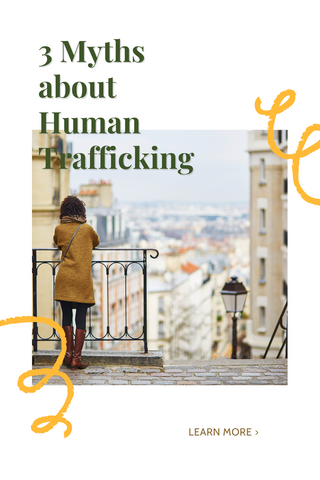3 Myths About Human Trafficking
At The Lemonade Boutique, we’re passionate about bringing an end to human trafficking. Human trafficking is the sale and exploitation of persons for purposes of labor or commercial sex acts. While I’m not an official expert, I have been studying human trafficking for over a decade and during that time I’ve found that there are three widely held myths about human trafficking. If you’re passionate about ending human trafficking as well but often wonder how you can help, this article is for you!

Myth #1: Human trafficking happens “over there”.
I’ve never met anyone who denies that human trafficking is a real problem. But I’ve met very few people who understand that it’s happening right next to them. The commonly held belief is that human trafficking only happens in the poorest countries.
Truth: Human trafficking has been reported in every country and every state.
According to the US State Department: “In the United States, individuals vulnerable to human trafficking include children in the child welfare and juvenile justice systems, including foster care; runaway and homeless youth; unaccompanied foreign national children without lawful immigration status; individuals seeking asylum; American Indians and Alaska Natives, particularly women and girls; individuals with substance use issues; racial or ethnic minorities; migrant laborers, including undocumented workers and participants in visa programs for temporary workers; foreign national domestic workers in diplomatic households; persons with limited English proficiency; persons with disabilities; LGBT+ individuals; and victims of intimate partner violence or other forms of domestic violence.”
Myth #2: All human trafficking is sex trafficking.
When most people hear of human trafficking, they are only thinking of sex trafficking. This is because sex sells, even when it comes to the reporting of human trafficking. Chances are that most times you’ve heard a news story about human trafficking, it was sex trafficking that was reported. It’s horrific and strikes a nerve, so that’s what ends on the headlines most often. We also see the term sex trafficking used most often when fundraising to end human trafficking because again, it gets more attention and is often more emotionally compelling.
Truth: Sex trafficking is only one type of human trafficking.
Sex trafficking accounts for less than half of all human trafficking cases. That certainly doesn’t make it less important or less horrific, but in order to fully exterminate human trafficking, we have to realize that it includes more than just commercial sexual acts. It also includes labor trafficking. Labor trafficking is when fraud, force, or coercion is used to persuade a person to keep working often in unsafe, isolated, and laborious conditions.
Myth #3 There’s nothing the average person can do to fight human trafficking.
We tell ourselves that there’s nothing we can do, that we’re not rich enough, qualified enough, or knowledgeable enough to help. We believe that human trafficking is best left to special forces, the Hollywood elite, or persons with huge social media followings.
Truth: Everyone has to pitch in to end the fight against human trafficking.
I love this quote by Reverend Charles Frederic Aked (1916) “It has been said that for evil men to accomplish their purpose it is only necessary that good men should do nothing.” We don’t need a few people fighting human trafficking perfectly, we need millions of people fighting it imperfectly.
How can you fight human trafficking?
- Learn the facts about human trafficking. Misinformation and sensationalism hurts the cause. Here’s a couple of great places to start:
- Advocate. There’s a lot of great non-profit organizations working to end human trafficking. They need more participants and make it super easy for you to advocate on their behalf.
- Shop ethically. Everyone purchases or has purchased items made by forced labor.
- Take the Slavery Footprint quiz to see how many slaves work for you.
- For future purchases, shop as ethically as possible. Shop with companies and brands that are proud of their supply chains, boast certifications like Fair Trade, GOTS, and WARP certified, and put people first.
